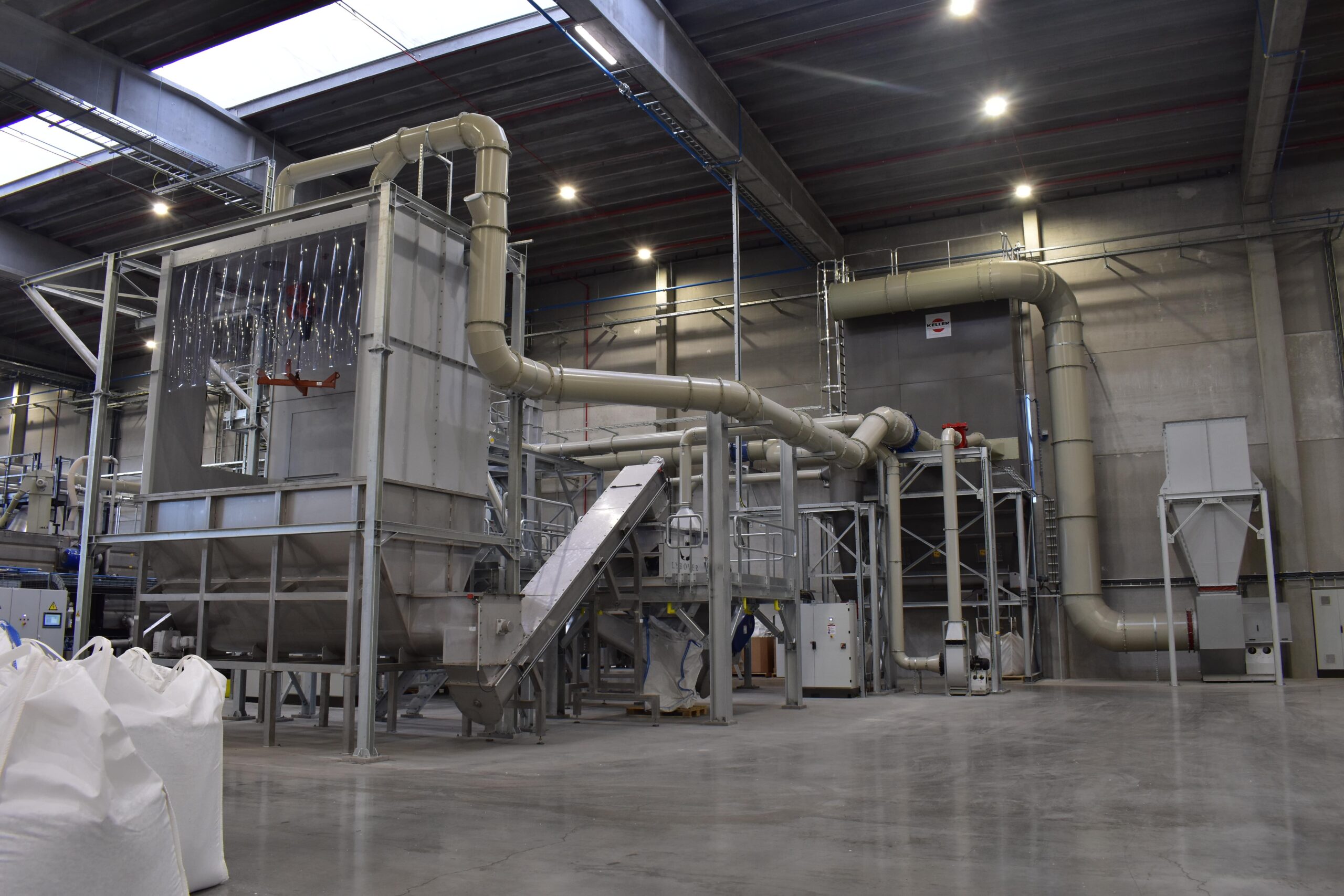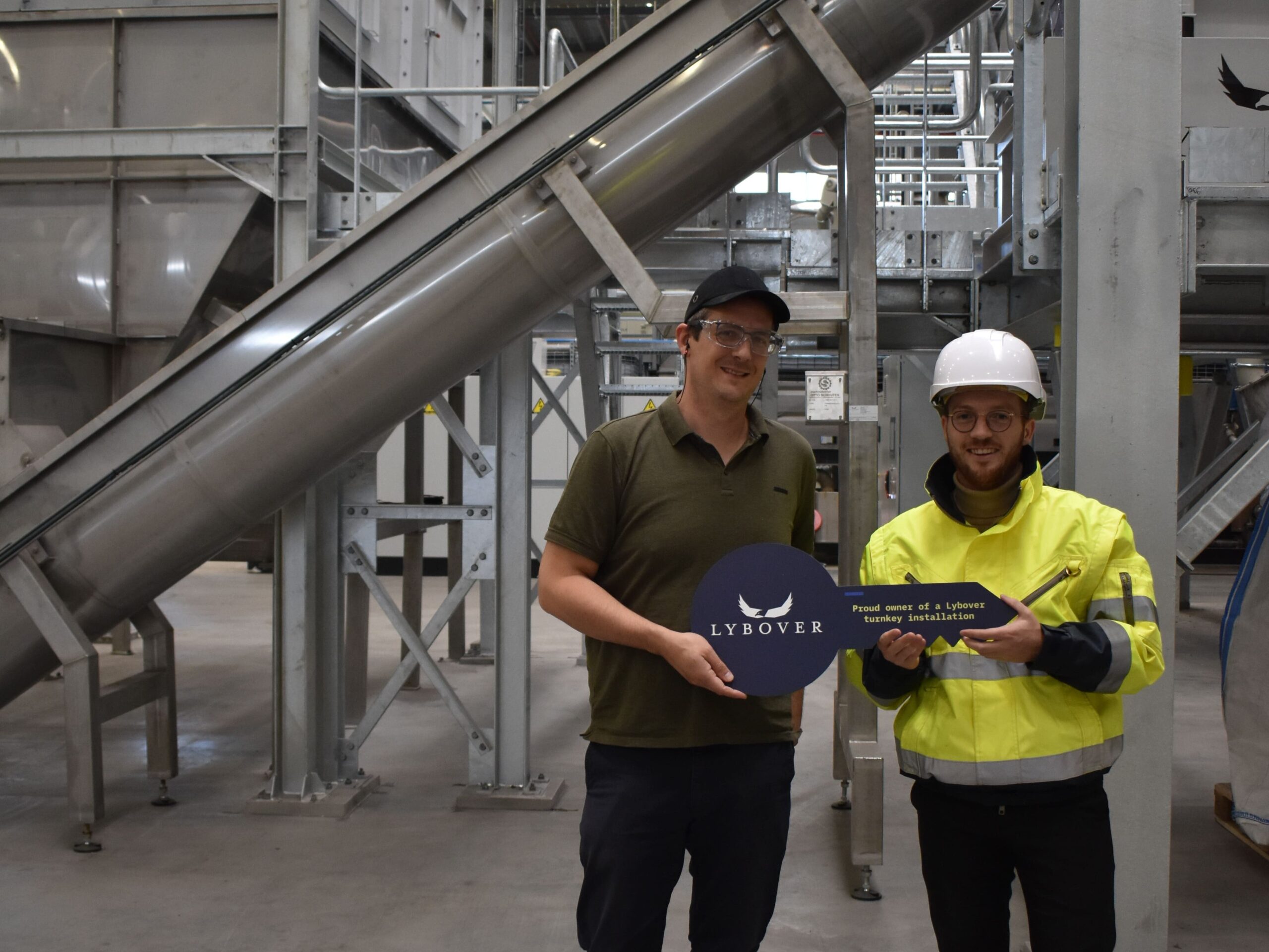Lavergne, a Canadian company specialised in the development of thermoplastics, settled in Belgium in 2021. When realising their turnkey recycling line, they were looking for a reliable partner to carry out the pre-treatment of the e-waste. Hamos, a regular partner of Lybover as well as of Lavergne, was able to warmly recommend us. And Lavergne soon chose us to carry out the separation and purification of the WEEE fraction. The colleagues from Lybover RECYCLING and Lybover AIR joined forces to design and build a recycling line with dedusting.
Thanks to great trust, cooperation on this project went smoothly. Several Lybover business units joined forces and managed to set up an installation that met all requirements.
The question: reclaiming raw material
Lavergne specialises in the design, development and production of high-quality durable resins (alloys and composites). “The aim is to further process and sort material from waste electrical and electronic appliances (WEEE), such as hoovers, refrigerators and coffee machines, to get granulates at the end that they can reuse for their resins,” explains Werner Reinertz, sales engineer projects at Lybover RECYCLING. “Our task? Taking the first step in this process: separating the plastic from the ferrous and non-ferrous metals that are disruptive for the next steps in the downstream process.”
“Lavergne was looking for a total contractor for that whole pre-treatment process,” picks up Lars Van Volsem, sales engineer projects at Lybover RECYCLING. “They asked us to purify the WEEE they receive. That is already a pre-sorted fraction that consists of plastic, but also iron, copper from guide wires, aluminium, copper, bronze, zinc, and so on. Those metals all have to be removed.”
RECYCLING AND AIR around the drawing board
With that assignment, the Lybover colleagues went to the drawing board to think out the process and assign the necessary components to it. “With an 8m³ dosing hopper, we feed the installation,” Lars explains. “This can be filled directly with a wheel loader or with big bags. The material is moved within the plant with conveyor screws. We opted for closed systems as this is better for dust control and also prevents spillage. The first step is an overflow magnetic drum (barium ferrite) from our partner STEINERT. This will attract and remove coarse pieces of iron. In the next stage, the material is reduced in a crusher to finer grains, up to about 20 mm. A sieve provides additional control. Finally, in the next step, non-ferrous metals are removed by eddy currents and an overflow magnetic drum (neodymium). After this, mainly plastics remain.”

Besides the recycling plant, Lybover also recommended installing dust extraction. “The dust released from processing the residual fraction needs to be captured,” says Lars. ” Different manipulations of the material create a swirl in the airflow and that creates dust. So at that place, we have to extract a certain air flow rate. Just think about the working conditions for the operators and possible explosion risks. That task was entrusted to Lybover AIR.”
From concept to end result
“Once the process is drawn out, we start translating that into a 3D concept. In doing so, we don’t just look at the techniques we need. We also make sure that everything is supported, that operators can access everything, that maintenance can be done easily. The customer wanted the plant to be as compact as possible, so we looked for the compromise of bringing size and accessibility together.”
After the thinking and construction process, the testing phase will follow. “We will also start up the plant. We do cold tests first. We then first let the installation work without equipment. We check whether everything is running correctly. Then we add the material and do a hot start-up. Then we see how the material flows and whether we need to make any adjustments. In a third stage, we set up the separation machines. The customer can then see the final quality. Then there is also room to determine the purity of the material.”
Synergy between units and customer
Together, Lybover RECYCLING and Lybover AIR were able to take control of the full scope of this project. Lybover METAL and Lybover INSTALLATION colleagues were also an important part of the project team.
“We are a local party,” says Lars. “That’s convenient for the customer for later maintenance and interventions. We are only an hour away from them. We have also built into the electrical cabinet an RC module, remote control. This allows us to remotely monitor when a fault occurs. In the next phase, we will also support with spare parts and annual interventions.”

“For the customer in particular, it was a great added value to be able to work with one party,” Lars continues. “We all sit together at the table with the customer, we point out some issues and that’s how we come out together. Projects like this also always have one overarching project leader. He is aware of everything and can act on it further.”
“From the beginning, the customer had confidence in us,” Werner adds. “Because of the experience with our partner in Canada, the parent company had chosen us right away and the cooperation also went very smoothly. The customer was someone with a lot of knowledge of industrial plants. When problems arose, he actively thought along with us. It was a nice synergy, both within our own areas of expertise and with the customer.”